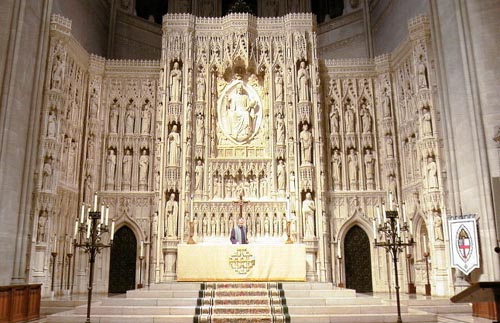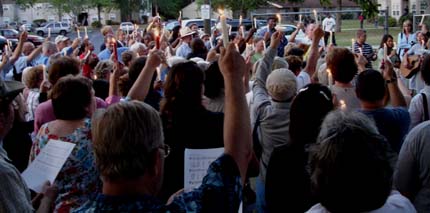The Power of Disturbing Faith

The high altar and reredos at Washington National Cathedral
Great cathedrals are by meticulous design, sermons in stone. From the overall architecture to every detail, a cathedral speaks of our faith in Jesus Christ. The sixth largest cathedral in the world, Washington National Cathedral is one such sermon in stone and what they placed at the center of the center of the church speaks to what is central to the Christian faith.
Within its inspiring Gothic edifice flanked with flying buttresses, the building houses a breathtaking array of architectural sculpture, wood carving, mosaics, leaded glass, artistic metal work, and many other works of art, including more than 200 stained glass windows. The focal point of the entire design is the high altar. Behind the altar is an intricately carved back wall piece called a reredos. The wall carving boasts 110 saints, prophets, martyrs, angels, and faithful Christians and at the center is Christ in glory—his right hand is held up making a gesture of blessing while his left hand holds a cross-topped globe signifying his sovereignty over the entire world.
The most prominent statues flanking this central figure of Christ in glory are not the apostles or other saints, but six allegorical figures. The statues show persons who are hungry, thirsty, in need of a place to stay, naked, sick and imprisoned. The persons most prominently close to Christ right at the focal point of the entire 150,000 ton cathedral are those Jesus refers to in his parable of the last judgment.
Jesus said when he comes in glory to judge the world there will be a pop quiz of sorts. But on this test, you will find no fine points of doctrine. Rather than sorting out the fine points of exactly what you believed, Jesus will want to know how you treated the least of those with whom you came in contact.
Jesus said that the faithful will be told in judgment, “Come, you that are blessed by my Father, inherit the kingdom prepared for you from the foundation of the world; for I was hungry and you gave me food, I was thirsty and you gave me something to drink, I was a stranger and you welcomed me, I was naked and you gave me clothing, I was sick and you took care of me, I was in prison and you visited me.”
The righteous will be unaware of the times they did these things, for they did not do them to impress Jesus, it just came naturally. Then, the unrighteous will discover that they never did any of these things for Jesus. It wasn’t that they meant to slight God, they just didn’t understand that, “just as you did not do it to one of the least of these, you did not do it to me.”
How would Jesus judge your life now? What about others around you? There’s the question, “If you were arrested for being a Christian, would there be enough evidence to convict you?” What if they through out church attendance as proof of your faith? Could you still get convicted as a Christian?
But what happened to faith? Don’t we teach that it is your faith that counts? Yes. But scripture also teaches that if we really have faith, our faith will be active. James wrote, “Faith with out works is dead.” And “show me your faith without the works, and I will show you my faith by my works.”
We show what we believe by the things we do. If what you read in the Bible doesn’t bother you on occasion, then you aren’t reading your Bible enough, for there is disturbing stuff in scripture. Scripture will disturb you enough to get you to want to reach out in love to those around you.
Reading your Bible, taking part in the worship of your church and praying will disturb you. They are supposed to disturb you. These practices of the Christian faith will move you from knowing about Jesus to knowing Jesus. And once we know Jesus, it is more and more difficult not to live into the faith we profess. Just believing is fine, but if you really believe, then you will also act.
Jesus wanted to know how your faith has disturbed you enough to get you to reach out to those who are hungry, thirsty, in need of a place to stay, naked, sick and imprisoned. Your checkbook and your calendar are your statements of faith. If how you spend your time, energy and money are no different from those who are not Christian, then in what sense are you Christian?
The carvings in Washington National Cathedral of the hungry, thirsty and naked are visible reminders that at the center of our faith in Jesus is Jesus teaching to not simply love God, but to love God and to love our neighbors as ourselves. The parable of the last judgment when sheep and goats are separated based on treatment of those in need shows this to be at the center of the Christian faith.
So the question commonly asked is applicable here, “When they drag you in to court for your faith in Jesus Christ, will there be enough evidence to convict you?” Jesus words in the parable of the sheep and the goats are not condemning, but fair warning. Think of Jesus’ parable of the judgment as a self test. If you ever wonder where you are on your spiritual journey, assess your life based on how you show the love Jesus’ has for those most in need. Jesus said that how you treat those in need reveals everything about where you stand before God.
If your faith has troubled you enough to change your life, it will show not in your concern for yourself, but in whether you have been disturbed enough to show love for others, even your enemies. This is Christianity. This is the faith that conquers even death. It begins with dying to yourself enough to see the world and those around you as God sees them. Find this idea disturbing? Good. It should be.
The above text is my religion column for today's Tribune & Georgia, which reminds me of this day three years ago (May 21, 2007) in which the community gathered in large numbers to pray at a dumpster in The Pines apartments because we were disturbed on behalf of our neighbors after a body was found there: Light in the Darkness

Labels: religion column







0 Comments:
Post a Comment
<< Home